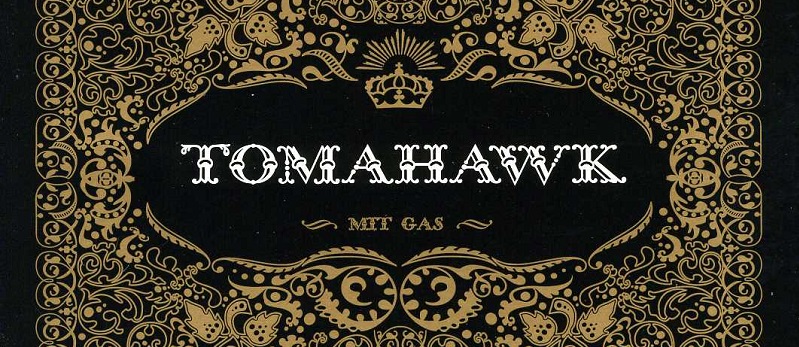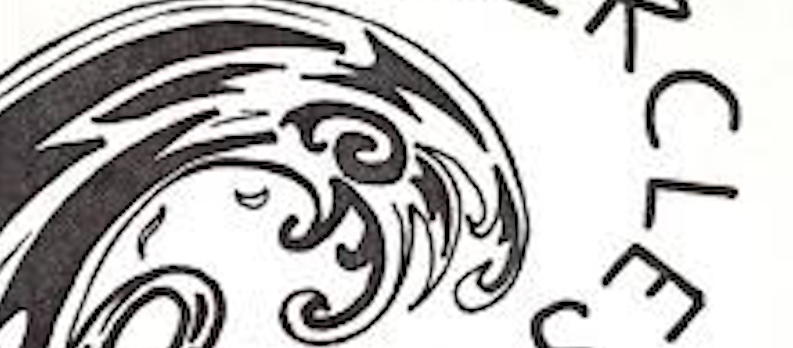Though it would be impossible to separate guitarist Duane Denison (The Jesus Lizard), drummer John Stanier (Helmet), and bassist Kevin Rutmanis (Melvins, Cows) from the proceedings, Tomahawk’s Mit Gas will be viewed, in large part, as a Mike Patton affair. This may come as somewhat of a surprise to some, especially those who were taken with the degree that Denison’s jazzy but barbed wire guitar chops defined the landscape of Tomahawk’s self-titled debut. But, to those who have followed Patton since his early days with Faith No More and Mr. Bungle, the levels at which the chameleonic vocalist works to saturate the new record are really no shock at all. The fact remains, however, that the latest release from Ipecac Records shows that Tomahawk is far from just another Patton pet project.
Mit Gas is a guitar-driven blast of rock adrenaline, the type of record that violently thrashes around like an animal but also makes sure to get the carefully crafted hooks of its songs firmly embedded in your brain. The songs are tight and addictive, the playing is top-notch, and the recording is more slick and pristine than just about every indie release of the year thus far all rolled into one. It’s also the most commercial disc that Denison has ever done and — arguably — the most accessible to mainstream sensibilities Patton has worked on since Faith No More’s King for a Day … Fool for a Lifetime, which hit the streets way back in 1995. If there’s any justice left in the realm of commercial radio — I know there isn’t, but bear with me — this disc is going to be in heavy rotation throughout the summer.
The record begins calmly but deceptively with a sample of birds chirping, a foreboding bass rumble, and the gentle weeping of Denison’s guitar, but it quickly kicks into gear with the pounding thrust of Stanier’s drums. The opening song, appropriately titled “Birdsong,” then shifts from the driving to the explosive, with Patton, over trademark Denison guitar lines, displaying nearly the full scope of his delivery on the record: the smoky whisper, the diaphragm-challenging wail, the throaty and almost demonic roar. “Birdsong” is followed quickly by “Rape This Day,” which makes full use of the cryptic, palm-muted guitar Denison worked to perfection with The Jesus Lizard. Beyond the creeping verses — which Rutmanis and Stanier punctuate with occasional off-time blasts of sound — the song has some of the catchiest riffs you’re likely to hear on this side of a Top-40 chart. What separates the song, and others like it on Mit Gas from an energetic but radio-friendly Patton track like Faith No More’s “Digging the Grave” are the diversions and digressions; in the case of “Rape This Day,” it’s an oddly muted and bass-heavy refrain between the big-volume choruses.
While the record is produced with a focus on the hook-heavy side of indie rock, Tomahawk makes sure to keep the songs developing at various paces, and, as a result, the record has more depth and dimension to it than much of the band’s debut. “You Can’t Win” is an borderline kitschy exercise in referencing latin jazz rhythms in indie rock. Despite the huge, rousing chorus, “Capt Midnight” is defined by the lingering sadness of Denison’s guitar and an electronic drum beat that’s laid right over the top of Stanier’s rhythms. “Desastre Natural” is a lounge band interlude, Patton cooing and crooning in a foreign tongue over spare percussion, swelling keyboards, and reverb-laced doo-wop guitars that wouldn’t have been out of place on Faith No More’s cover of “Easy.” That laid-back funk atmosphere also pervades “Harelip,” which oozes from bass-heavy verses into more straight-forward, guitar-driven choruses, complete with Patton’s wails. Though it slows the movement of the record a bit, the atmospheric “Harlem Clowns” sounds like it’s suspended frozen in mid-air, waiting for a solo from a sitar. The strange samples on the song could have been taken right off Mr. Bungle’s self-titled major label debut. These aren’t the finest moments on the record, but they keep Mit Gas from falling into the predictable pratfalls of big-guitar rock conventions.
But, above all else, Tomahawk is still quick to remind us that they can write a record song that can mop up the floor with our collective asses, so to speak. “Mayday” is probably one of the best songs the band has cut to date. Driven forward by the subtle stop-and-start of bottom-heavy guitar and bass, and a skittering guitar lead, the track is also defined by spacey but ominous keyboards, Patton’s diverse range of deliveries, and Stanier’s drums, which could have been lifted right from Tamir Muskat. A bridge where Denison unleashes a guitar solo straight out of The Jesus Lizard’s Goat is alone worth the price of admission.
Elsewhere, the band plays the quiet-loud/verse-chorus-verse punch a little more safely, as on “Rotgut,” or The Jesus Lizard-heavy “When the Stars Begin to Fall.” Again, the diversions keep the record way above whatever formulaic, hook-heavy rock Tomahawk’s major label Bizarro counterparts would struggle to record. On “Rotgut,” the band breaks into a refrain where Denison’s fingers race at mind-blowing warp speeds around the neck of his guitar, cutting quickly between a repeating, lightning-fast solo measure and the chord-heavy swagger of the song’s verses. On “When the Stars Begin to Fall,” Patton belches and screams over the verses so violently, you’re almost waiting for his head to split open and give way to the maniac antics of David Yow.
But how does the band close up their big record? With “Aktion 13F14,” a strange pseudo-ballad with country-western guitars, tom-heavy drums and a Speak-and-Spell narrative about the art of hand-to-hand combat. Huh? After several verses and choruses, the song fades and then quickly crashes right back into the forefront with a clattering refrain of pounding tribal drums, uncontrollable guitar feedback, and Patton’s shrieked vocals. After yet another fade, we exit with a reprise of Denison’s cool, crystalline electric guitar, completely composed and lingering as the record spins to a stop. It may not be a fitting end to a record that is so clearly meant to shake you and get you moving, but it’s also somehow not anti-climactic.
Much press will no doubt be given to how Patton continues to stretch his boundaries as a vocalist and songwriter on Mit Gas –– he does — but the fact remains that, if you listen closely, you can hear each of the four members quite clearly. Moreso than on their debut, Tomahawk is a band proper on Mit Gas, measurable as more than the total of their respective resumes, and ready to apparently take over the world airwave by airwave. – Delusions of Adequacy, June 2, 2003
-30-




